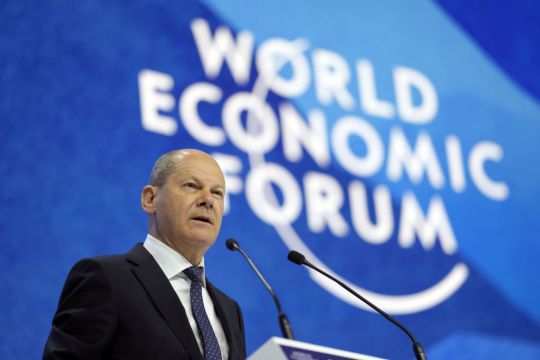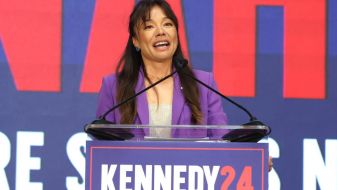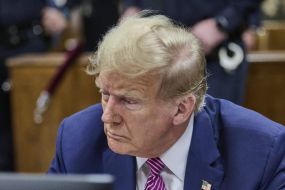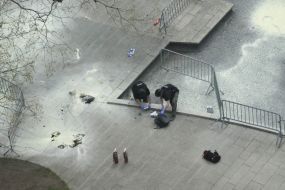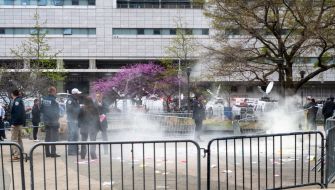German chancellor Olaf Scholz has expressed hopes for global co-operation on climate change, hunger and war, while dozens of climate activists demonstrated in the Swiss town of Davos as the meeting of global elites ended.
The German leader ratcheted up his criticism of Moscow’s military onslaught in Ukraine during a speech on the last day of the World Economic Forum’s annual meeting.
He said Russian president Vladimir Putin “wants to return to a world order in which the strongest dictate what is right, in which freedom, sovereignty and self-determination are not”.
Putin's war is not the sole reason for a global watershed. In this multipolar world, very different countries with growing influence are demanding a greater political participation. This is not a threat. We will open up new ways of cooperation. #wef22 2/3
— Bundeskanzler Olaf Scholz (@Bundeskanzler) May 26, 2022
Advertisement
Voicing hopes for countries to work together on shared crises, Mr Scholz said today’s world was no longer bipolar as it was during the Cold War era – when the United States and the Soviet Union dominated geopolitics.
“If some want to take us back to the past of nationalism, imperialism and war, our answer is ‘not with us’. We stand for the future,” he said in the final major address of the week in Davos.
“When we realise that our world is becoming multipolar, then that must spur us on to even more multilateralism, to even more international co-operation.”
As he spoke, scores of young people protested across town behind banners that read “Cut the (BS)!” and “There is no Planet B” – adding a coda of condemnation to the gathering of elites in Davos that is often derided for being more about talk, business and relationship-building than action.

Forum organisers reject such claims, insisting they want to improve the state of the world by drawing in decision-makers.
The yearly gathering in the Swiss Alps – twice suspended over the Covid-19 pandemic – has been overshadowed this year by the war in Ukraine, rising food and fuel prices, and signs that governments are not doing enough to fight global warming.
Ukrainian president Volodymyr Zelensky, foreign minister Dmytro Kuleba and an array of lawmakers, local officials and business leaders who made the journey or joined by video link captured the spotlight to drum up support for their country’s gruelling and uncertain campaign to oust Russian forces.
Mr Putin’s campaign has drawn international scorn and unsettled his allies, and as a result, Russian envoys from business and government who have been staples at Davos since the end of the Soviet Union were not invited this year.

Mr Kuleba voiced little hope that the war could come to a negotiated end, or even a pause, anytime soon.
“The moment Russia will agree to a ceasefire will be the moment it will be one step away from losing the war,” he told reporters.
“They (the Russians) will agree to a ceasefire with only one purpose: to save themselves from losing the war. Until then, this war will continue.”
The upshot of Ukraine’s efforts is to rally countries around a budding democracy with ambitions to join the European Union – the free-world and free-market club – in the face of an onslaught by a Russian regime that clamps down on dissent and centralises power in one man: Mr Putin.

Meanwhile, a deadly school shooting in Texas in the US on Tuesday was on many minds in Davos. More broadly, battles against global warming, a food crisis, and cyberattacks by hackers from Russia and beyond have exposed how progressive leaders from civil society, corporations and government have struggled to cope in a world facing simultaneous crises.
Many touched on the need to find solutions to the blockade of Ukrainian ports, preventing its critical stocks of wheat, barley and sunflower oil from getting to the world and threatening food insecurity in countries in Africa, the Middle East and Asia.
The European Union and United States have accused Russia of using food supplies as a weapon and say there have been talks of opening secure shipping corridors.
Russian officials are blaming western sanctions or Ukrainian mines in the sea.
World Trade Organisation director-general Ngozi Okonjo-Iweala said on Wednesday: “This food crisis is real, and we must find solutions.”
